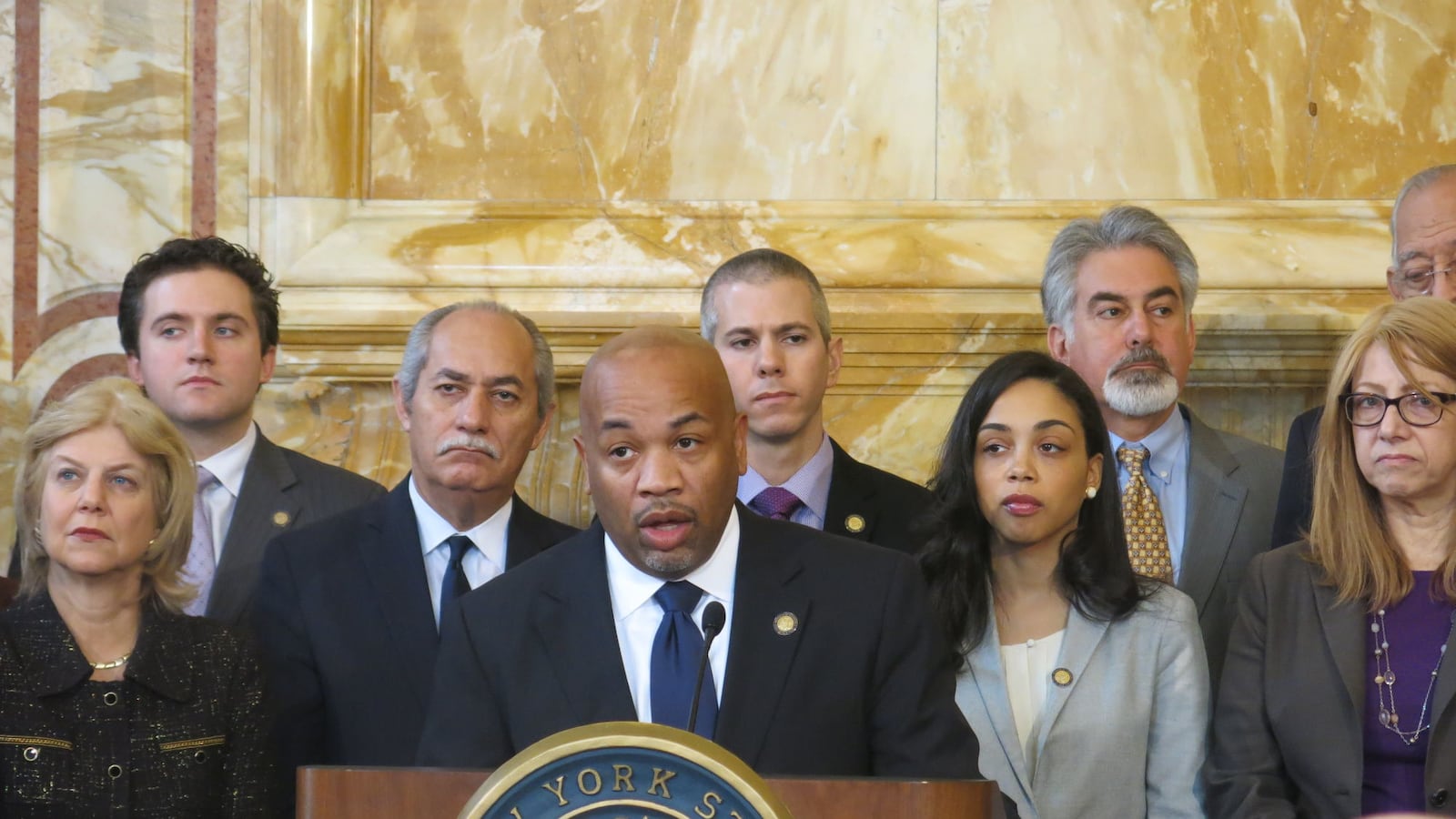Updated — A state budget agreement reached Sunday night will make teachers wait an extra year to become eligible for tenure, establishes a state-imposed model for turning around struggling schools, and increases education spending, according to lawmakers and news reports.
Full details of the agreement will not be available until Monday, officials said. But the announcement indicates that New York’s legislative leaders reached agreement on some thorny education issues before the Wednesday deadline for an on-time budget.
“With this agreement, we address intractable problems that have vexed our state for generations,” Gov. Andrew Cuomo said in statement.
The consensus came after lawmakers agreed to address many of the aggressive education policy changes Cuomo sought — including an overhaul of teacher evaluations — after or outside of the budget process. Other proposals, such as increasing the number of charter schools allowed to open in New York and renewing mayoral control of the city school system, were dropped from budget negotiations last week.
Some were quick to declare victory. United Federation of Teachers President Michael Mulgrew said most of the policies his union had opposed were not included in the agreement.
Here’s what is included in the deal.
Funding: Education spending will increase by about $1.4 billion, State Senator Dean Skelos said in a statement accompanying the governor’s announcement. Assembly Speaker Carl Heastie put the total increase at $1.6 billion. Both are more than the maximum Cuomo had proposed, $1.1 billion, but significantly less than what the Board of Regents, some advocacy groups, and the teachers unions had sought.
It’s unclear how that money will be divvied up. Skelos said his statement that it would include “a dramatic reduction in the Gap Elimination Adjustment,” a cost-cutting program that has affected smaller and suburban school districts more severely than New York City. Cuomo had wanted to tie any funding increase to a full set of policy changes, many of which are not included in the agreement.
Teacher evaluations: The state education department will be tasked with overhauling teacher evaluations, Heastie told reporters. The decision to defer making changes and to tap the department for the job shows just how toxic the issue has become for lawmakers, since the legislature has criticized the department’s handling of various education policy issues for more than a year.
Under the new system, teachers who earn an “ineffective” rating two years in a row could be fired in 90 days unless they can provide evidence that challenges those ratings. Teachers rated “ineffective” three years in a row could be fired in 30 days if they could not prove that fraud played a role in their ratings.
How teachers earn those ratings would also change. The new system won’t dictate that student state test scores and observations count for specific percentages of a final score. (Currently, they count for up to 40 percent and 60 percent, respectively, and combine to form a final rating.) It would also allow several kinds of student assessments to be used.
Teacher who receive the lowest ratings on the student performance segment wouldn’t automatically earn an overall “ineffective” rating, as is the case under the current system. Now, they could also receive a slightly higher “developing” rating.
Cuomo had pushed for specific changes to teacher evaluations be included in the budget, including increasing the role of state test scores to half of a teacher’s overall rating. Last week, lawmakers had debated putting changes in the hands of the Board of Regents or a separate panel.
Teacher tenure: Tenure protections will not be available until after teachers have spent four years in the classroom, up from the current three-year requirement, Heastie told reporters. Teachers now would have to receive a rating of “effective” or “highly effective” in three of those four years in order to receive tenure, State of Politics reported.
Cuomo had sought to make the cutoff five years and tie eligibility to teacher evaluations, with a single low rating derailing a teacher’s progress toward eligibility.
Tenure rules have also been the subject of a lawsuit that is winding its way through the state court system. Parents are suing to overturn several state laws that determine tenure and termination rules, arguing they violate their children’s constitutional right to a quality education. It’s unclear if an overhaul of the termination law for tenured teachers is part of the budget agreement.
Struggling schools: Some version of a proposal to allow for the takeover of persistently low-performing schools is in the budget agreement, but the scope of that plan is not yet clear. Heastie told reporters that schools would have extra time to improve before the state gets authority to take them over.
Cuomo had proposed a model in which struggling schools would be turned over to a state-appointed “receiver,” which could include school-turnaround experts, other school districts, or charter school operators who would be able to get around collective bargaining agreements and city rules.
Mulgrew said in his statement that the budget agreement ensured “local oversight of struggling schools,” and he told his members on Sunday night that “the school chancellor, not the state, will appoint the receiver” and collective bargaining rights would be preserved.

